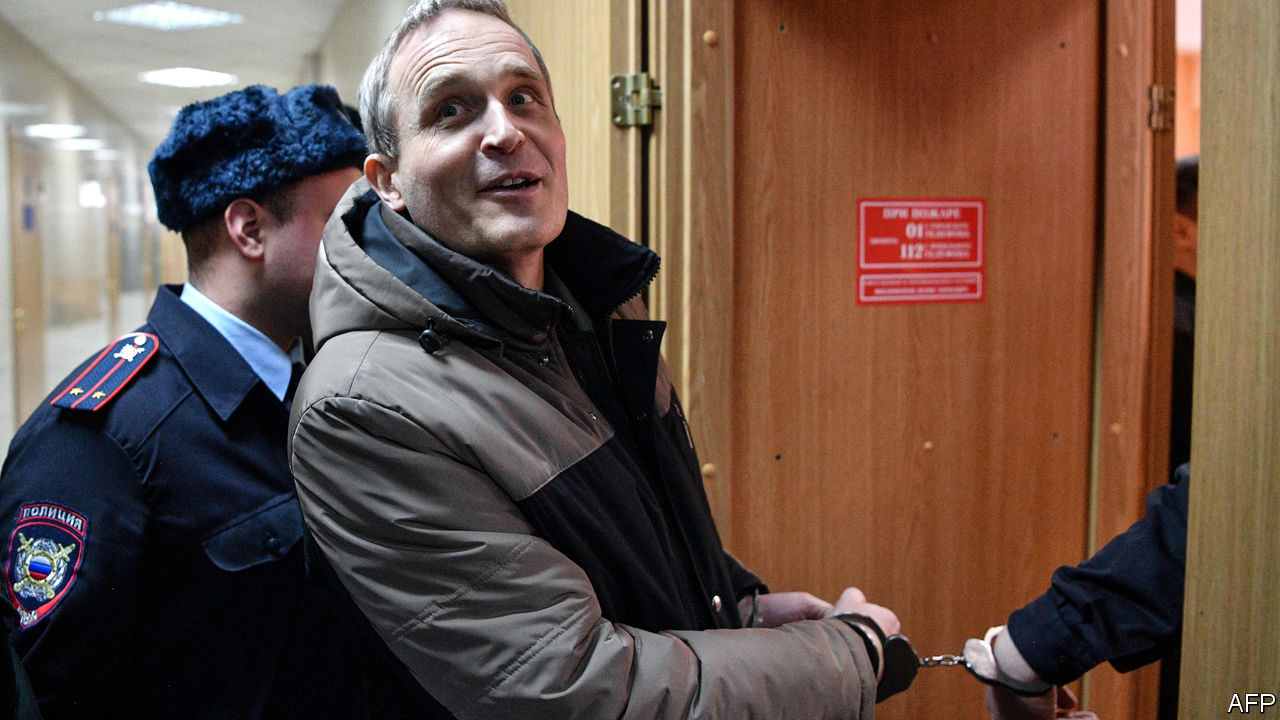
MANY WESTERNERS regard the Jehovah’s Witnesses, handing out tracts on street corners or knocking on strangers’ doors, as somewhere between a colourful eccentricity and a mild irritation. But authoritarian governments have often regarded them as a threat to society. So, at certain times (especially in periods of war), have democracies.
Regardless of their own feelings about the sect, people who monitor religious freedom were shocked by a six-year jail term that a Russian court imposed this week on a Danish follower. The punishment was handed down to Dennis Christensen (pictured), who has lived in Russia for years and led Bible readings in a local branch of the sect. It was widely described as the harshest violation of freedom of belief that the country has seen in recent years, and an ominous throwback to Soviet practices.
It follows a decision taken nearly two years ago to ban the entire group, under the terms of a Russian law that defines extremism in the vaguest of terms, and that was amended in 2007 to embrace some non-violent movements. Almost 100 Russian members of the sect face criminal charges under that law, and more than 20 are in pre-trial detention. Ever since the law was changed, the courts have been tightening the noose on the Witnesses, first by categorising their literature as “extremist” and asserting that to be a practising member of the group was in itself extremist behaviour. A threshold was crossed in April 2017 when the Supreme Court supported the justice ministry in deeming the entire Russian branch of the sect extremist.
To many observers this reflects a Russian policy that fosters “traditional” religion only insofar as it reinforces loyalty to the state. With their pacifist stance and American roots, the Witnesses are at the opposite end of that spectrum. The group’s national headquarters near Saint Petersburg has been seized and branches all over the country have been raided. Their hopes of an easier life rose briefly in December when President Vladimir Putin said it was “nonsense” to persecute them because they were Christians of a sort. Now Russian officialdom appears to have decided otherwise.
Still, the Witnesses, who are based in the United States and claim a global membership of around 8m, are nothing if not resilient. The sect, whose history spans just over a century, already has plenty of experience of enduring persecution and unpleasant encounters with officialdom. With their firm belief in the imminence of the end times, they describe themselves as law-abiding in most respects. But they also profess an indifference to earthly powers that many governments have often found exasperating.
The biggest point of friction between the Witnesses and worldly governments is their unwillingness to engage in military service, profess allegiance to national flags or even vote in elections. In the United States, before and after the second world war, the Witnesses fought lengthy court battles to win exemption from conscription and the requirement (in schools, for example) to salute the Stars and Stripes. In Canada, the authorities interned many Witnesses during the war on grounds that they were a “subversive” force. Witnesses also point out that they stood up to Nazi Germany, refusing to give the Nazi salute or join pro-Hitler organisations; more than 1,000 of them died in concentration camps. Much more recently, the sect has faced criminal charges in countries ranging from communist Cuba to capitalist Singapore.
Another point of friction between the Witnesses and officialdom is their refusal to accept blood transfusions for themselves or their children. This is based on an interpretation of certain passages in the Old and New Testaments. In 2017 a Canadian coroner undertook an investigation into the deaths of two Jehovah’s Witnesses who died shortly after giving birth, and affirmed that under the law, adults do have the right to reject transfusions (or any other medical procedure) once the consequences have been explained. However, in Italy and South Africa, courts have insisted that the children of Witnesses must be given medically necessary transfusions even when their parents object.
Mainstream Christian churches are suspicious of the Witnesses because the sect is at odds with them over certain key doctrines. For example, it refuses to accept the idea of the Trinity, or a single God in three persons, and it predicts that sinners will be punished with annihilation rather than eternal tribulation. One striking difference is that Witnesses believe that Jesus was crucified on a single wooden stake, not a cross, so they refuse to accept the cross as the key symbol of the faith. The Witnesses believe the final phase of humanity’s life on earth has already been reached, but they do not hazard a precise date for the end of life as we know it.
The European Court of Human Rights had vindicated the sect in a couple of key judgments. One was the Kokkinakis case of 1993, a landmark in religious jurisprudence, which found that a man in Crete who preached the sect’s doctrines, and had repeatedly been arrested, had suffered violation of his religious freedom. In 2011 the ECHR agreed that their religious liberty had been violated by the French state when it imposed a sudden tax demand of €58m ($81m) on the movement’s French branch. In both France and Germany, authorities baulked for many years at recognising the sect as a religion but eventually did so.
On balance, Western courts have come to accept the right of propagators of unusual beliefs to make their pitch to strangers, whether in the street or at the door, and present their interpretation of the Bible, however idiosyncratic. No less sacred is the right of those strangers to shut the door or simply walk on and say a firm “no thank you”. In the growing number of countries where the government claims a right to monitor and guide people’s metaphysical beliefs, it is a different story.








